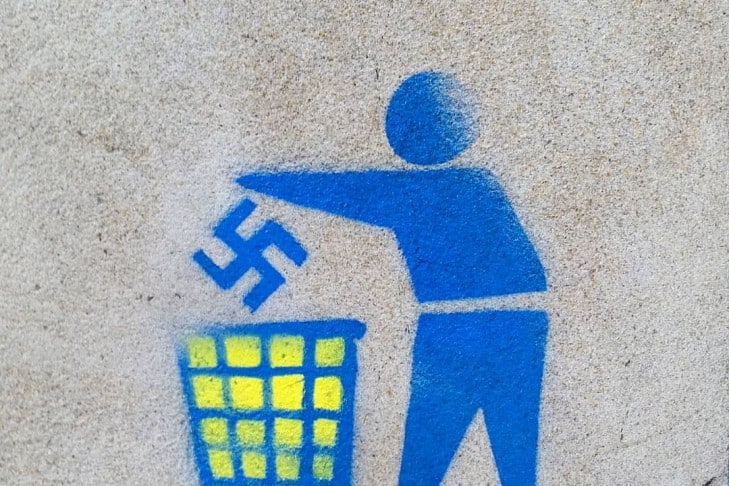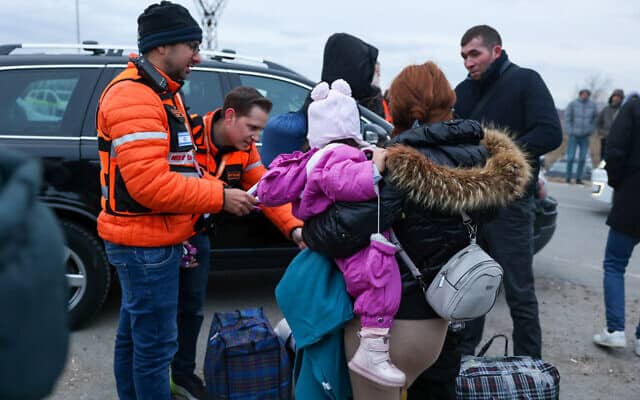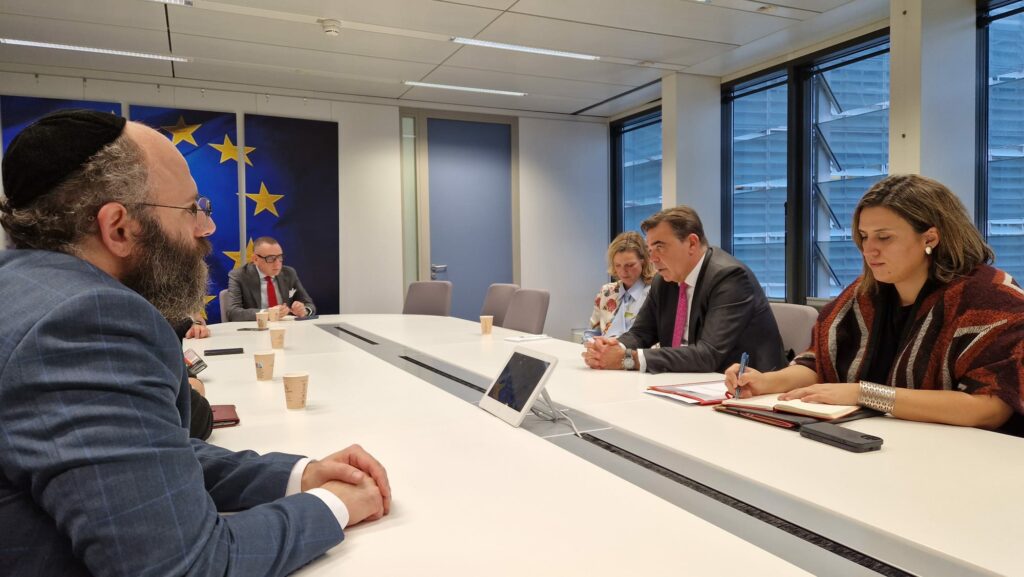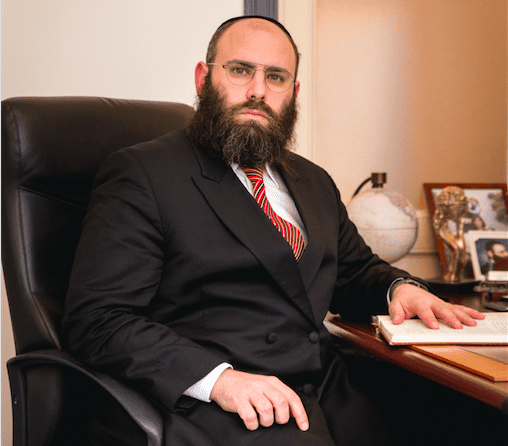The European Jewish Association is very happy and proud to welcome another organisation to our growing roster of partners. We have just concluded and signed a Cooperation and Partnership Agreement with the Jewish community of mönchengladbach, Germany
We eagerly look forward to many positive exchanges and fruitful cooperation with our new partners from the Lithuanian Jewish community. Together, we hope to achieve a lot of beautiful and important things, all the while jointly working towards the betterment and wellbeing of both German and European Jewry.
Additional Articles

EU seeks to rally against anti-Semitism
Under Germany’s presidency, the member states are planning to take decisive action against antisemitism in Europe in light of increase anti-jewish conspiracy theories during the COVID-19 pandemic.
In December, the heads of state and government seek to adopt a declaration at the next EU summit to establish a uniform approach within the European community against all forms of hatred towards Jews.
“It is our constant, shared responsibility to protect and support Jewish life actively,” says the draft resolution, which is set under the preamble: “Anti-Semitism is an attack on European values.”
The initiative to develop binding guidelines was put on the agenda by Germany, which holds the EU Council Presidency until the end of the year. Two years ago, the member states committed themselves to national strategies against anti-Semitism the first time.
Especially during the Covid-19 pandemic, it was observed how anti-Semitic prejudices were openly conducted.
Among other things, the declaration calls for “awareness of anti-Semitism in all political areas” and the tackling of “a cross-cutting issue in which various government agencies and policy areas at local, national and European level should be involved.”
Recently, a study by the Israeli foreign ministry indicated how anti-Semitism significantly increased ever since the pandemic had started, particularly in regard to conspiracy theories.
According to the analysis, most anti-Semitic statements connected with the world health crisis were posted online in the US, France, and Germany.
The EU’s plan states that “anti-Semitic conspiracy myths are often the first step that can lead to hatred, hate speech, incitement to violence, and hate crimes.”
The latter is why the heads of state and government and the European Commission seek to upgrade the European anti-Semitism commissioners’ work.
In drawing up the declaration, they worked closely with the Jewish organizations and responsible specialist politicians in Europe. There is positive progress at the European level; however, the effects are not yet reaching the Jewish Europeans. The latter is why the EU Commission also seeks to present a common strategy with further concrete measures against anti-Semitism next year.
Within the member states, the new EU agreement is intended to provide authorities such as public prosecutors and police forces and social institutions such as schools in the future as a practicable basis for assessing anti-Jewish tendencies.
Germany’s council presidency has been under the radar due to the Covid-19 pandemic. The upcoming December declaration, however, could mark a significant moment, nonetheless.
Read More
- November 24, 2020

Ways to help the Jews of Ukraine
In response to the Russian invasion of Ukraine, Jewish organizations are directing aid for tens of thousands of Jews living in the embattled country, assisting refugees who are fleeing the fighting and helping area Jews who have been trying or are hoping to immigrate to Israel.
Below is a partial list of organizations that have ramped up ongoing efforts in the region or opened emergency mailboxes since the start of the war.
• The Jewish Federations of North America has an emergency mailbox for helping people immigrate to Israel, securing the local Ukrainian community and its institutions and maintaining critical welfare services, among other needs.
• Tikvah Children’s Home in Odessa has launched an Emergency Ukraine Relief Campaign as it evacuates over 650 orphans, students, alumni and their families from the war zone into neighboring Moldova.
• The American Jewish Joint Distribution Committee has a longstanding presence in the country, assisting impoverished seniors and supporting a network of Jewish community centers and social service agencies.
• The Afya Foundation, in conjunction with UJA-Federation of New York, is preparing urgently needed wound care, surgical equipment and biomedical equipment to be shipped to Ukraine.
• The American Jewish Committee’s emergency #StandWithUkraine fund is pledging to direct 100 percent of the funds to those meeting urgent needs in Ukraine, including IsraAID, the rapid response Israeli relief agency, which is assisting refugees of all backgrounds in neighboring Moldova.
• HIAS is working through channels within the US and throughout Europe to support the safe and speedy resettlement of those seeking to leave Ukraine.
• Notes of support and friendship to HIAS and Jewish community center staff in Ukraine can be sent to general inboxes at partner JCCs that are located throughout the Ukraine.
• The Jewish Agency for Israel has opened an emergency hotline to provide Ukrainian Jews with guidance and information regarding the immigration process, as well as general assistance.
• The Chabad-Lubavitch movement has a Ukraine Jewish Relief Fund.
• Masorti Olami has a fund for Ukrainian Relief.
• UJA-Federation of New York has a dedicated mailbox supporting its partners providing humanitarian needs in Ukraine.
• Project Kesher is currently supporting an Emergency Fund for Women in Ukraine.
• The B’nai B’rith Ukraine Assistance Fund is accepting donations.
• Agudath Israel has a Ukraine Emergency Relief fund that has raised $10 million as of March 10.
• United Hatzalah of Israel has sent medical professionals to Ukraine’s borders in Operation Orange Wings. Donations to their fund help deliver medical care to Ukraine.
• JRoots runs heritage trips to Poland to tell the story of the Holocaust. Since Russia’s invasion of Ukraine, it has repurposed to assist Ukrainian refugees into Poland and settle abroad. Contact Ayelet at +972 54-636-6512
• First-responder group IsraAID is on the scene as thousands of Ukrainians seek refuge in Moldova. IsraAID is providing psychological first aid and distributing essential relief supplies. Donations towards emergency support for Ukrainian refugees can be made here.
• Magen David Adom, Israel’s branch of Red Cross International, has established a Russian-language refugee call center. Donations can be made here.
• Hadassah, The Women’s Zionist Organization of America has opened a fund, “Ukraine in Crisis: Save Lives at Risk!” in support of the Hadassah Medical Organization, which is already treating Ukrainian refugees at its centers in Israel.
• The Brussels-based European Jewish Association (EJA), representing hundreds of communities across the continent, has launched a Europe-wide campaign to temporarily provide homes, food and clothing to hundreds of Jewish families whose lives have been torn-apart and up-ended by the conflict in Ukraine. For further information contact: +32 (0)476056450
• United Jewish Appeal/Keren Hayesod is working together with The Jewish Agency for Israel and the Government of Israel to provide the necessary support to assist Ukrainian Jews hoping to immigrate to Israel during the crisis, as well as supporting Jews hunkered down in Ukraine. It has opened a fund called, Saving Ukrainian Jews’ lives in the Shadow of War.
• The Orthodox Union has opened a Ukraine Crisis Fund to support individuals and organizations assisting people on the ground in Ukraine.
• World Jewish Relief has been working in Ukraine for the last 30 years, and has helped 13,000 older and more vulnerable Ukrainians within and beyond the Jewish community in the past year alone. Its Ukraine Crisis Appeal is raising funds to support the organization’s 29 partners in Ukraine, along with partners in neighboring Moldova and Poland, which are providing food, cash, medical, material and psychological support to those fleeing or unable to escape the violence.
• The World Union for Progressive Judaism has launched the Ukraine Crisis Fund to support the safety and well-being of the Ukrainian Jewish community.
• Keren Hayesod – United Israel Appeal is working with the Jewish Agency and the Israeli government to expedite immigration to Israel for Ukrainian Jews, as well as assist the Jewish community remaining in Ukraine with essential goods such as food, supplies, security and other necessities.
- March 14, 2022

EUROPEAN COMMISSION VICE-PRESIDENT PROMISE TO EXPEDITE SECURITY TO JEWISH COMMUNITIES WELCOMED AFTER MEETING WITH EUROPEAN JEWISH ASSOCIATION
“They are tracking flights from Israel and knocking on doors to identify Jewish homes”, “I must wear a bullet proof vest to take my children to school”, “Jew hate that I haven’t witnessed since the Holocaust”, just some of the comments relayed to Commission Vice-President Schinas and the EU Co-ordinator for combatting for antisemitism Katharina Von Schnurbein today.
(Brussels, 8 November) A delegation of Senior Jewish Leaders affiliated to the European Jewish Association (EJA) that represents hundreds of Jewish Communities across the continent held an emergency meeting with the European Commission Vice-President responsible for the portfolio of Combatting antisemitism, Mr Margaritis Schinas in his offices in Brussels today along with the EU’s Co-ordinator for Combatting antisemitism and fostering Jewish life Katharina Von Schnurbein.
At the meeting with Vice-President Schinas and Co-ordinator Von Schnurbein, Mr Schinas gave a commitment to expedite the process of providing emergency security to Jewish Communities left reeling by an unprecedented surge in antisemitism across the continent.
Ms Ellen Van Praagh, Vice-Chaiir of the EJA and Chair of Holland’s interprovincial Rabbinate (IPOR) told the Commission Vice-President,
“We are facing an unbelievable tide of hatred and there is genuine fear for our lives. We have in Holland a situation where some Palestinian supporters are actively tracking flights coming into Schiphol to identify Jews, we have the same people knocking on doors of houses to identify Jewish Households. Our buildings are being vandalised and defaced. This is pure intimidation, and we fear the worst is coming.”
Baroness Regina Suchowolski-Sluszny, Vice-Chair of the EJA and Chair of Forum of Jewish organisations of Antwerp (FJO), who survived the Holocaust as a ‘hidden child’, said
“Vice-President, the levels on antisemitism, in the media, on social media and in the public domain are levels I haven’t seen since I was a child. We are in a very dangerous place right now, and it feels like a tipping point. Jews are once again in the crosshairs of those who hate us, and this time they think they can get away with it using the conflict as cover.”
Mr Gabriel Senderowicz, Member of the Jewish Leader’s board of the EJA, and President of the Jewish Community of Porto gave his personal assessment,
“I am here today only because I received permission from the security services to travel. I have been warned that my life is in danger, and today, in the Europe of the 21st Century, I must wear a bullet proof vest to take my child to school and go about my daily life. My crime? I’m a Jew.”
The delegation was led by Rabbi Menachem Margolin, the chairman of the European Jewish Association who said in a statement after the meeting,
“In the meeting I made it clear to the Vice-President that communities did not have the luxury of time for form-filing and EU bureaucracy to better secure themselves when their very lives are under threat.
“Our communities need support, they need security, and they need it yesterday. We welcome the commitment given by Vice-President Schinas to expedite the process of emergency provisions to secure Jewish communities across the continent.”
EJA Managing Director Georgios Papadakis added,
“We understand that the European Commission must help provide urgent humanitarian aid to Gaza, but surely it is incumbent upon them to provide protection and security for their own citizens who are facing a veritable tidal wave of the oldest hatred – that of antisemitism.” Ends
- November 9, 2023

Words for Pesach by the Chairman of EJA, Rabbi Margolin
The pandemic has upended so much of our daily lives, including the most sacred: our holy days.
Millions of Jews around the world will be celebrating Pesach this evening in ways that up until a few weeks ago was unimaginable, without family around them, without the bustling celebration around the table. It will of course be hard for all of us.
Of course, the irony of celebrating our holiday of freedom whilst we are in confinement due to a plague – the coronavirus, will not be lost on us.
And yet, even amongst this adversity, we are being given the opportunity to celebrate Pesach in a unique way, loaded with significance that can, in fact, bring us closer to the story of our exodus from Egypt. How?
Let us be honest, how many of us really appreciate what freedom means? In our modern lives the vast majority of us are free to come and go as we please. This pandemic has given us a flavour of what it is like to lose freedoms that we take for granted, and in the process brings us closer to our ancestors, who lost theirs under Pharaoh. It brings the holiday alive.
Truly both nights will be different from all the others, they remind us to truly appreciate the everyday blessings that the almighty bestows on us everyday, our families, our jobs, our friends.
I wish you, and your families a Pesach Sameach, and G-d willing next year in Jerusalem!
- April 24, 2020









